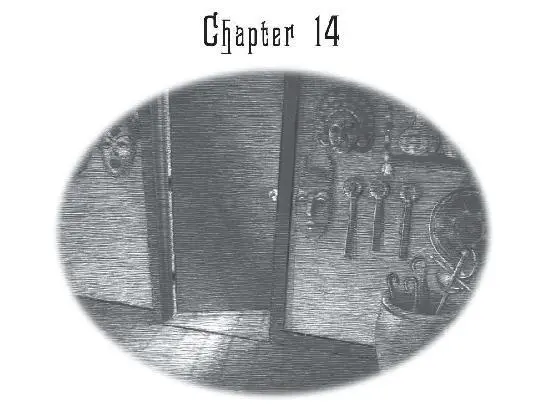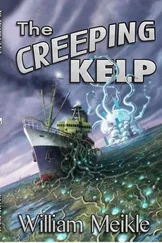“You know how unique that ghost is,” I said. “Other spirits communicate, but only in fragments, snatches of words. The skull is different, and I—I don’t want to lose that connection. If possible, I’d like to find a way….I could try it on my own, of course, but if Lockwood and Company would be prepared to help me, I’d be very grateful….As to that, it’s up to you.”
We sat there. For a minute or two, no one said anything.
“George,” Lockwood said, “how many cases have we currently got?”
“A few. Hol will know how many. And there’s a possible new client coming to see us this morning. You remember, the one from out of town. Which reminds me, we should really get some sleep.”
Lockwood nodded slowly. “Well, Luce, we could look into this for you. Not just for the skull’s sake, though I see that it’s important. As far as I’m concerned, it would be because of what those men tried to do to you.” He took a bite of waffle. “But, technically speaking, that would make you our client rather than our colleague. Would you be okay with that?”
He had that look that I knew so well: a kind of shining, as if the spark of adventure had been ignited within him. George was shaking his head and huffing mightily, but I saw the electricity in his eyes, too. It was strange: as a client, as someone firmly in their debt, things felt easier between us than they had since the day I’d left.
“I’m okay with that,” I said, and I meant it. “Thank you, Lockwood. Thank you, George. And…and if we’re talking about payment…”
Lockwood raised a hand. “We’re not. Good. That’s settled, then. Now, if you can remember your way upstairs, we all need to get to bed.”

My sleep that morning was as deep as death; and, on waking, I experienced complete disorientation. Surfacing like a free diver who had stayed below too long, I found myself staring at the sunlit beams of my sweet old attic bedroom. I sat up and looked around me, and for those few short moments I was still working at Lockwood & Co. and the events of the last months were nothing more than a twisted, fading dream. Then I noticed some of George’s socks draped like weary snakes over the windowsill, and piles of his garments rising like sinister gravestones at the bottom of the bed, and the world tipped back again.
I took an awkward shower in the tiny bathroom wedged beneath the eaves, keeping my bandaged arm outside the curtain. Then I got dressed. The bright spot here was that I had fresh clothes. Upon opening my door, I’d found a neat arrangement of folded items waiting on the landing step. They were all mine, things I must have left behind in my rush to leave four months before. Someone—Holly, I supposed—had washed and ironed them in the meantime. I took them in and sorted through. In the end I had to wear the same skirt, but the rest was clean, which made me feel much more presentable.
My body seemed light, strange and bloodless, as if I were recovering from a fever. Moving slowly, I went down to the second floor landing. The walls were still decorated with odd items of bone, shell, and feather: the ghost-catchers and other Eastern curios brought back to England by Lockwood’s vanished parents many years before. And there, closed as ever, was the door to Lockwood’s sister’s room, the place where she’d died. In short, everything was as it always had been—but it was as if I were seeing it for the first time. Forbidden rooms, unhappy memories…How close the past was in this house, how tightly it ringed poor Lockwood.
Voices were coming from the living room below. It was mid-morning; the client meeting they’d mentioned must be in progress. I would not disturb them. I slipped downstairs and sneaked toward the kitchen.
There’s a particular creaky floorboard near the foot of the stairs. A man had once died on that spot, and George claimed the noise (which he swore had only started after the death) was an example of an ultra-low-level haunting. Me, I thought it was just a creaky floorboard. Either way, I stepped on it as I went by.
The living room door was slightly ajar. At the sound, the voices stopped.
“Is that you, Lucy?” Lockwood called. “Come on in and join us! We’ve got cake.”
Slightly reluctantly, I poked my head into the room. There they were, lit by diagonal shafts of sunlight—Lockwood and George, sitting by the coffee table, plus Holly, plus a kid I didn’t know. There was a splendid checkerboard cake on the table, frosted with sugar, as pink and yellow as a cubist dawn. They were doing the client-welcome thing. Holly was in the process of pouring tea.
George glanced up. “Look, another of our clients! Got them coming out of our ears today. Check under the sofa! There’s probably more hiding behind the curtains.”
“Sorry,” I said. “I didn’t mean to interrupt you all. Hi, Holly.”
Holly had quit pouring and was gazing at me with evident concern. In the old days I’d have bristled at her attention, suspecting it of being patronizing and insincere. Now it didn’t really bother me; I was even glad of it, in a way. “Lucy,” she said, “I’m so pleased you’re all right.” She frowned. “What have they done to your poor arm?”
“Oh, don’t worry. It’s just a graze.”
“I’m talking about the bandages. That’s simply the most incompetent bit of first aid I’ve ever seen. Lockwood, George— how much dressing did you use? I’m surprised Lucy could fit it through the door.”
Lockwood looked hurt. “It was a pretty decent effort for two a.m. We thought it was better to be safe than sorry—we didn’t want to find random bits of her lying about the house when we got up this morning. Maybe you can fix it later. Lucy, you’re just in time. Come and sit down. This is Danny Skinner. He’s come for our advice.”
“Thanks,” I said. “But listen, I’m good. I don’t want to butt in. I’ll see you when you’re done.”
“No, we could do with your wisdom.” He grinned. “As long as you don’t charge us for your time. Holly, more tea. George, another slice of cake. Then we can get started.”
Well, what was I going to do otherwise? Sit in the kitchen by my lonesome, staring at George’s map for an hour? And that cake did look good—better than a burger or Thai noodles, which is what I usually had for breakfast. So it was only with a minor hesitation that I drifted in, took up position in my old, familiar seat, and had my first real look at Lockwood & Co.’s second client that morning.
From the first there was one particular thing that made him stand out. It wasn’t his disheveled appearance, his muddied, tattered clothes, or even the rat-a-tat trail of ectoplasm burns that ran across his coat like a frozen burst of gunfire. It wasn’t the way he sat bolt upright, either, his eyes blank orbs filled with remembered horror, agitatedly rubbing the swollen knuckles of his left hand. We got stuff like that every day of the week. It wasn’t even the lucid manner in which he spoke, spelling out the horrors inflicted on his community. No, it was none of those things that made us sit up and take notice.
So what did? His age. Or lack of it.
Danny Skinner wasn’t an adult. Like I say, he was a kid. About ten years old.
That was unusual.
Children see ghosts. Adults complain about them . As George once pointed out, there are several almost immutable rules surrounding the Problem, and this (George’s Third Law) is one of the most obvious. As psychic detection agents we get plenty of witness statements from children, but it’s the grown-ups who actually come knocking on our door. They’ve got the financial firepower to hire us; plus, the kids are usually too busy out working (and dying) as Sensitives, members of the night watch, or even as agents themselves to ask someone else to help them out.
Читать дальше










